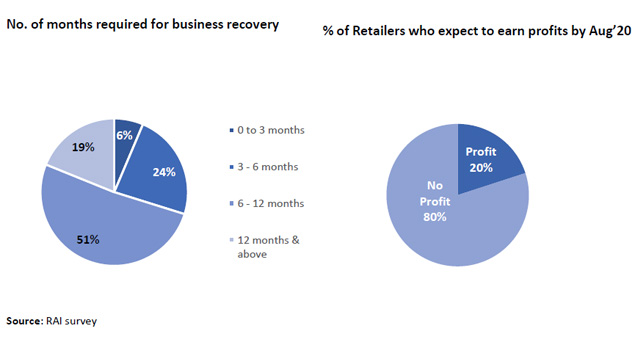
Survey on impact of COVID-19 on Indian retail

Retail
206 week ago — 5 min read
Indian retail industry has more than 15 million traditional and modern retailers. Retail employs ~40-50 million people directly of which modern trade employs more than 6 million Indians equaling to almost 12% of the total retail consumption of the country.
Retail contributes around 40% to India’s consumption and ~10% to India’s GDP.
The lockdown implemented by Government to prevent the spread of COVID-19 to prevent the spread of coronavirus in the country has greatly affected retail business. Most stores, except stores selling essential food & grocery, have been shut across the country. Garments, Saris, Electronics, Mobile Phones, Furniture, Hardware, etc. almost all stores are closed. Non-Grocery/Food Retailers are reporting 80% to 100% reduction in sales. Even retailers of essential items are facing losses as they aren’t allowed to sell non-essential items, which would bring them higher margins.
85% of the retail costs are fixed costs, which is putting several financial pressures on retailers. The industry is experiencing severe liquidity challenges, which can lead to large scale unemployment. The cash inflow of the industry has come to a standstill, while the fixed operating costs remain intact.
85% of the retail costs are fixed costs, which is putting several financial pressures on retailers. The industry is experiencing severe liquidity challenges, which can lead to large scale unemployment.
Concerned by the state of affairs, Retailers Association of India (RAI) conducted a survey with retailers (members and non-members included) to gauge their view on the impact of COVID-19 on their business and manpower. The survey was filled by 768 respondents across India. Two key classifications were made for all the respondents–
Food and Non Food Retailers – 135 (18%) of the respondents were Food Retailers and 633 (82%) were Non Food Retailers
Size of Retailer -
- Small Retailers: Less than 100 persons employed (500, 65% of respondents)
- Medium Retailers: 100 – 1,000 persons employed (182, 24% of respondents)
- Large Retailers: More than 1,000 persons employed (86, 11% of respondents)
Following were the key highlights of the survey results:
1. Impact on Non-Food Retailers – More than 95% of Non-Food Retailers have their shops closed in the lockdown and are looking at practically no revenues till the lockdown is in place. In the next 6 months, Non - Food Retailers expect to earn 40% as compared to last year’s revenues
2. Impact on Food Retailers – Most of Food Retailers also sell non-essential goods in the same and / or different stores. The non-food business in the stores has come to a standstill in the lockdown leading to revenue loss. Additionally 25% of these retailers have non-food stores which have been closed leading to further losses. In the next 6 months, Food Retailers expect to earn 56% as compared to last year’s revenues.
3. Overall Business Outlook – 70% of retailers expect business recovery to happen in more than 6 months, 20% expect it to take more than a year
- <10% of Medium and Large Retailers expect to earn any profits till Aug’20, 26% of small retailers expect to earn profits in the same time period

4. Manpower rationalisation – Small retailers are expecting to lay-off 30% of their manpower going forward, this number falls to 12% for Medium Retailers and 5% for large retailers. On the whole, retailers who responded to the survey expect layoff of about 20% of their manpower.
Key asks from Government:
- Employer Support and Rent Waivers: 2 out 3 Retailers employing substantial workforce want employee salary and rent support to manage their fixed costs and limit manpower downsizing. Without this support the Retailers are looking at ~20% Manpower reduction due to COVID-19
- Relief on GST, Taxes and Loans: 2 out of 5 Retailers want concessions and relief in this area to ensure business continuity in the face of the revenue downfalls and heavy losses for FY’21. Government and Financial Institutions have to come together & provide a meaningful package for the Industry to survive the impact of COVID-19
- Electricity & other utilities: Retailers are requesting for additional 60 days for payment of electricity charges and waiver of minimum demand charge for the same period. 1 out of 10 Retailers consider this as a key ask from the government to manage finances in this period of uncertainty.
Also read: An unprecedented challenge, also an opportunity for SMEs to do unprecedented things
Image source: shutterstock.com
To explore business opportunities, link with me by clicking on the 'Invite' button on my eBiz Card.
Disclaimer: The views and opinions expressed in this article are those of the author and do not necessarily reflect the views, official policy or position of GlobalLinker.
Most read this week





















Comments
Please login or Register to join the discussion